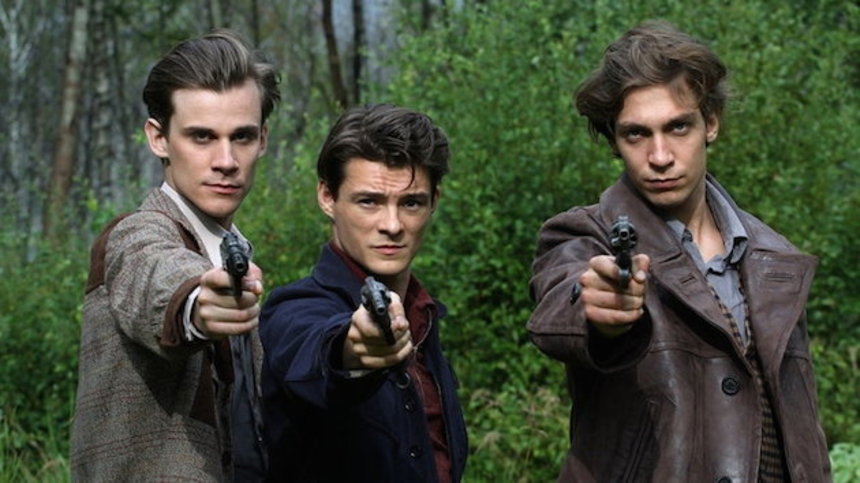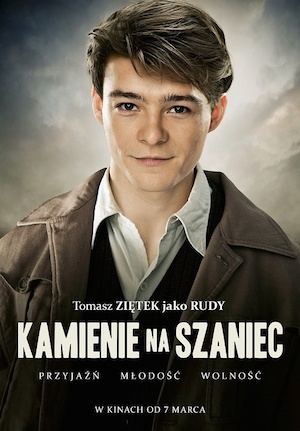Review: STONES FOR THE RAMPART Is A Serviceable Ode To Young War Heroes

Based on Janusz Kaminski's legendary 1943 book of the same name, Stones for the Rampart pays homage to a group of teenage partisans from the underground paramilitary Polish Scouting Association operating under the codename "Grey Ranks" during World War II. At the center of the action are three longtime friends and main advocates of the so-called "minor sabotage". Rudy (Tomasz Zietek), Zoska (Marcel Sabat), and Alek (Kamil Szpetycki) know that in the occupied Warsaw death hides behind every corner, but their determination to fight for independence is indefatigable.
Following the example of the book and its first film adaptation - Jan Lomnicki's striking and elegiac 1978 Operation Arsenal - Stones for the Rampart takes on a more hair-rising and emotional turn when Nazis capture Rudy and begin torturing him in order to get information about the underground movement. Heroic and unbroken, the boy remains loyal to his comrades and doesn't spill the beans. The picture reaches a climax with great intensity during Operation Arsenal, a desperate and urgent attempt at rescuing Rudy from the hands of the devil himself. Its outcome raises an important topic and asks whether it's worth sacrificing lives to save another? What follows is a brief yet tonally confused contemplation on the decline of heroism as presented through Zoska's sudden infirmity and moral breakdown.

Robert Glinski has found a rational way of differentiating between the protagonists' private lives and their daily struggles against enemy regime. It's relatively easy to sympathize with the anger that fills their souls and the patriotic values they try to embody, even when the motivation behind risky actions isn't explicitly visible. Nevertheless, the fierce passion which permeates the picture's fierce and thickening atmosphere - often visualized within the storyline's most dramatic sequences - engenders and reignites all kinds of positive nationalist feelings. Apart from being a valuable exercise in moral courage, Stones for the Rampart chronicles the sensations that the boys - particularly Zoska - go through in order to persevere through physical and emotional pain, and preserve the connecting power of brotherhood.
Ridiculous though it may seem, the fact that the boys are often depicted spending time with their girlfriends caused uproar among some people. Who could've thought that a single and very random reflection on the boys' sexuality would not only extenuate a treasured myth of a heroic stance, but also add a silly adult overtone? Don't believe what some might claim - there's almost no nudity in the film and those who try to ridicule the story by foolishly stating that young people 70 years ago didn't have sex should really just keep quiet.
Pawel Edelman's experience in the field of cinematography allows him to penetrate the everyday battlefield with many abrupt close-ups that give this visual manifestation of bravery an intimate touch, but not until the pivotal moments is the potential of the shaky cam fully exploited. Brutal depiction of tortures is often scarring, yet grasping the actual meaning of the tragedy makes it slightly more bearable. Perhaps too extreme is the contrast in one heartbreaking scene, where exhausted and bloodstained Rudy crawls on the ground while Pola Negri's "Tango notturno" plays handsomely in the background. Speaking of Mrs. Negri, there's one small goof linked to her name - a young woman wants to go to a cinema and see a film starring the famous actress, a wish that couldn't possibly be fulfilled in war-torn Poland.
Rudy's actual role is reduced to being a symbol of bravery and prowess. He's a martyr who works as a catalyst for change and brings the boys together. Most of the action, however, concentrates on Zoska, his rise to the position of a leader, and later on his inability to face the reality in which guilt is eating him alive. Inexperienced actors give rather convincing yet overly nonchalant performances, while the brotherly chemistry results in some cheerful and touching moments.
Saddening is the fact that Alek, also an important figure in the book, doesn't get much screen time. Always in the shadow of the two friends, he utters no more than a few words and quickly trivializes his position. It's hard to understand why the script changed a real hero into a lifeless marionette.
There are so many details that make Glinski's heroes look like a bunch of 21st-century hipsters parading in clothes from the 40's without appreciating the meaning of it all. In dialogue full of pompous statements and quotes that seem strangely out of context the passion and beliefs are identifiable, albeit undervalued. The description of Polish youth in Stones for the Rampart is definitely inconsistent with the one in the book but, after all, isn't this the sort of vision which people these days really want to see?
Although its intentions aren't always clear, Stones for the Rampart is still a quite effective, well-paced ode to a bygone era and all the known and unknown heroes that created its timeless myth. Beyond that, it's also a fairly engaging - and perhaps the most serviceable - addition to the Polish war genre in recent memory.
Stones for the Rampart
Director(s)
- Robert Glinski
Writer(s)
- Wojtek Palys
- Dominik W. Rettinger
Cast
- Tomasz Zietek
- Marcel Sabat
- Kamil Szeptycki
- Magdalena Kolesnik

Do you feel this content is inappropriate or infringes upon your rights? Click here to report it, or see our DMCA policy.






